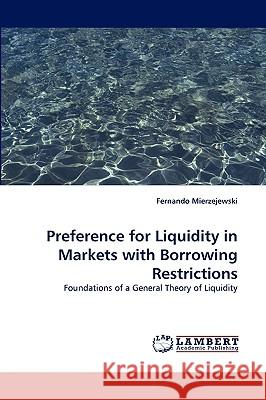Preference for Liquidity in Markets with Borrowing Restrictions » książka
Preference for Liquidity in Markets with Borrowing Restrictions
ISBN-13: 9783838347530 / Angielski / Miękka / 2010 / 116 str.
The global crises suffered by major economies in the last decade have persuaded people that capital markets can be intrinsically unstable after all. However, this is a fact that enters in contradiction with major theorems of classic financial economics theory, which assume that individuals can always borrow funds at a predetermined price. An alternative theoretical setting is proposed in this book that explicitly incorporates the presence of liquidity restrictions. At the core of the approach, an optimal liquidity principle is presented, which is determined in order to minimise the sum of the price of deposit insurance and the opportunity cost of capital. At the corporate level, the principle provides a basis to define capital allocation rules within financial conglomerates. More generally, the model is applied to characterise the preference for liquidity and hence the money demand of the economy. Finally, the principle is also used to describe the response of markets of short-term loans to capital and investment flows. In this way, the foundations of a general theory of liquidity are established.











